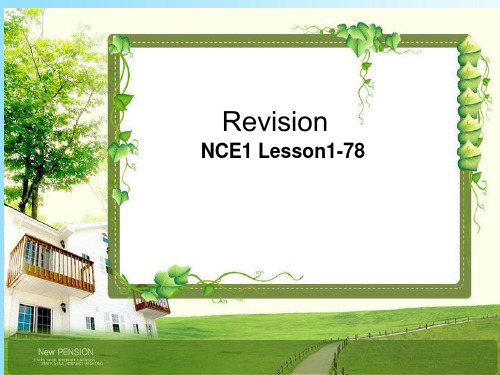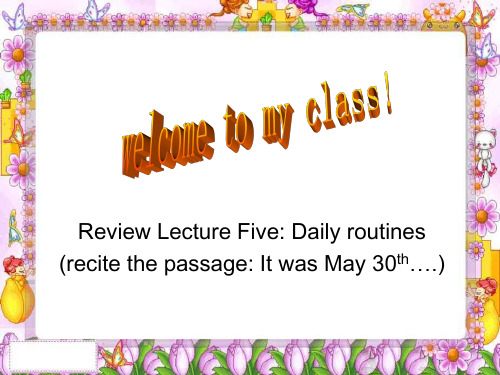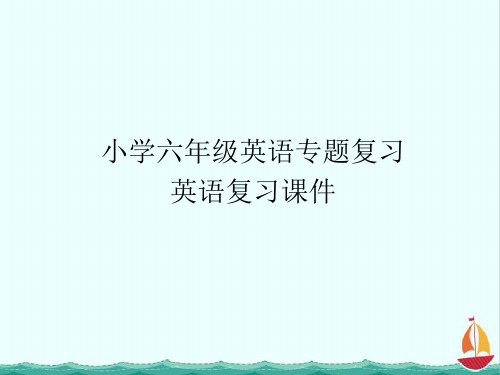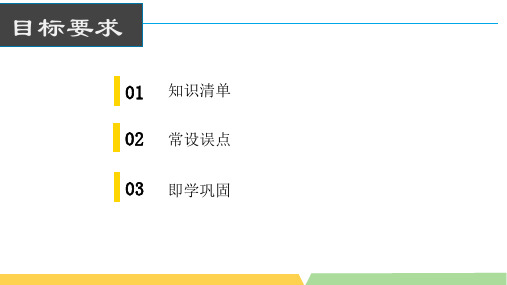英概复习课件
合集下载
高考英语复习之形容词和副词(公开课)课件

2.知识储备
(2)常见的动词、名词变形容词的后缀:
(1) -al: nature→_n_a_t_u_r_a_l music→m__u_s_i_c_a_l centre→c_e__n_t_r_a_l (2) -ful: care→_c_a_r_e_f_u_l doubt→_d_o_u__b_t_ful
many _t_r_a6di7t_io_n_a_l _(tradition)stories about
前 后
Hawaii that were ___h_u_g6e8ly___ (huge)popular
兼 顾
with tourists.
,
答
案
立
提问 胡艳慧
现 。
3.高考真题 (1)形容词和副词相关的词类变换
立 现
runners live three years __l_o6n1g_e_r_(long) than non- 。
runners.
提问 田凯甜
3.体会高考
形容词、副词的比较等级及相关句型
(2)设空前有用来修饰比较级的词语much、far、 a
great deal 、 a little、a bit、 even、any(三多两少 前
3.体会高考 形容词、副词的比较等级及相关句型
(4)设空后有表示范围的标志词“in+范围”“of +范围”“among+范围”等时,用最高级。
(2018·全国III) He screams the__lo_u6d3e_s_t _(loud)of all. The noise
shakes the trees ...
“变”:become/turn/get/grow/go;
1.熟悉形容词、副词的位置
中考英语复习:补全对话课件(34张PPT)

做好补全对话的关键:
做题重场景,巧用上下文 补全对话=场景句型+上下文判断
小试牛刀
What are you going to do tomorrow ? A: Hello, Jack. 1._________________________________ B: I am going to see Lisa tomorrow. She’s in hospital. A: 2. _____________________________________________? What’s wrong with her / What happened to her B: She had a traffic accident on her way to school and was hurt. I am sorry to hear that A: 3. _______________________. Is there anything serious? B: Yes. There is something wrong with her leg. A: 4. _________________________ Can I go to see her with you ? B: Sure. Let’s go together. A: When and where shall we meet? B: We’ll meet at the gate of our school at eight o’ clock tomorrow morning. How will/ shall we get there A: OK. 5. __________________________? B: What about taking a bus? A: Good idea.
做题重场景,巧用上下文 补全对话=场景句型+上下文判断
小试牛刀
What are you going to do tomorrow ? A: Hello, Jack. 1._________________________________ B: I am going to see Lisa tomorrow. She’s in hospital. A: 2. _____________________________________________? What’s wrong with her / What happened to her B: She had a traffic accident on her way to school and was hurt. I am sorry to hear that A: 3. _______________________. Is there anything serious? B: Yes. There is something wrong with her leg. A: 4. _________________________ Can I go to see her with you ? B: Sure. Let’s go together. A: When and where shall we meet? B: We’ll meet at the gate of our school at eight o’ clock tomorrow morning. How will/ shall we get there A: OK. 5. __________________________? B: What about taking a bus? A: Good idea.
新概念英语第一册复习课件

新概念英语第一册复习课件
形容词 名词前,be动词后
• dirty-clean sharp-blunt good-bad • lazy—hard-working busy-free • same-different • comfortable-uncomfortable • smart lovely tired thirsty terrible fresh
tobacco stereo refrigerator electric cooker hammer kettle teapot envelope pad change photograph passport fashion appointment noise • 学校:chalk handwriting subject conversation phrasebook • 房子:building cloakroom • 方位:middle north south east west • 疾病: temperature flu measles mumps aspirin
新概念英语第一册复习课件
• 星期:week Sunday Monday Tuesday Wednesday Thursday Friday Saturday weekend
• 季节:season spring summer autumn winter • 地点:village church dairy town • 生活:case carpet fork spoon cupboard cigarette
• 五号 • 一个新学生 • 电脑操作员 • 工程师 • 空姐 • 我女儿的 • 上楼 • 相同的颜色 • 一顶可爱的帽子 • 推销员
新概念英语第一册复习课件
• office assistant • customs officer • taxi driver • an ice cream man • the dressing table • the stereo • on the right • on the left • in the middle of • put on
形容词 名词前,be动词后
• dirty-clean sharp-blunt good-bad • lazy—hard-working busy-free • same-different • comfortable-uncomfortable • smart lovely tired thirsty terrible fresh
tobacco stereo refrigerator electric cooker hammer kettle teapot envelope pad change photograph passport fashion appointment noise • 学校:chalk handwriting subject conversation phrasebook • 房子:building cloakroom • 方位:middle north south east west • 疾病: temperature flu measles mumps aspirin
新概念英语第一册复习课件
• 星期:week Sunday Monday Tuesday Wednesday Thursday Friday Saturday weekend
• 季节:season spring summer autumn winter • 地点:village church dairy town • 生活:case carpet fork spoon cupboard cigarette
• 五号 • 一个新学生 • 电脑操作员 • 工程师 • 空姐 • 我女儿的 • 上楼 • 相同的颜色 • 一顶可爱的帽子 • 推销员
新概念英语第一册复习课件
• office assistant • customs officer • taxi driver • an ice cream man • the dressing table • the stereo • on the right • on the left • in the middle of • put on
感官动词 中考英语语法专题复习(全国通用)课件(共61张PPT)

昨天我见他正在花园里干活。(强调"我见他正干活"这个动作)
03
The managers discussed the plan that they would like to see carried out the next year.
感官动词的用法
1)感官动词+宾语+v
表示经历事件的完整过程
2)感官动词+宾语+v-ing
表示主语的状态、特征和身份等
常用词:be(是),look(看起来),seem(似乎),feel(感觉), appear(出现),smell(闻起来),taste(尝起来),sound(听 起来) 例句:He is a good father. 他是一位好父亲。
She looks younger than before. 她看起来比以前年轻。
A
B
C
D
sing; to sing
singing; singing
sing; singing
to sing; singing
【解析】经常听见Jom唱歌,强调Jom唱歌的全过程,用hear sb.do sth。Listen!表示听见他正在唱歌, 用hear sb.doing sth.。
优秀ppt公开课ppt免费课件下载免费 课件感 官动词 中考英语语法专题复习(全国通用 )课件 (共61 张PPT)
表示主语从一种状态到另一种状态,但侧重于 转变后的结果
常用词:turn(转变),become(成为),get(得到),grow(增长), go(去),fall(跌落),come(来),prove(证明)
例句:Everyone will grow old. 每个人都会变老。 Everyone will grow old. 每个人都会变老。 After a few years, the things got worse and worse. 几年后,情况变得越来越糟糕。
Unit 1-Unit 2(九年级全册)-2023届中考英语一轮大单元复习课件 (人教版)

4.wise(adj.)→ wisely (adv.)明智地;聪明地;有见识地★ 5.strange(adj.)→ stranger (n.)陌生人;外地人★ 6.steal(v.)→ stole (过去式) → stolen (过去分词)偷;窃取 7.warm(adj.)→ warmth (n.)温暖;暖和★ 8.punish(v.)→ punishment (n.)处罚;惩罚★ ▲punish sb.for(doing) sth.因(做)某事而惩罚某人
5.business n.生意;商业 n.事情;职责;职业 It's none of your business.那不关你的事。(n.) I don't have a head for business.我没有商业头脑。(n.)
6.review n.回顾;复习;评论;检讨;检阅 v.回顾;复习;重新调查 例:After she finished reading the book,Alice wrote a review for the school newspaper.艾丽斯读完这本书后,给学校报纸写了评论。(n.) Review what you learned last class as quickly as you can before the class begins.课前尽可能快地温习你上节课学的内容。(v.)
2.note n.笔记;记录;便条;音符;纸币 v.注意;指出 例:She left a note for Mike on the table.她在桌子上给迈克留了张便条。 (n.)
Don't bother me.I am taking notes.不要打扰我。我正在做笔记。(n.) I have nothing in the world but a million-pound note.除了一张百万英 镑的钞票,我一无所有。(n.) Please note that the office will be closed on Monday.请注意办事处星期 一将关闭。(v.)
中考英语复习--形容词和副词专题 课件(共38张PPT)

2.I am very busy.(修饰形容词) 3.He runs too quickly .(修饰副词) 4.We play happily. (修饰动词)
⑤通常在形容词后加-ly变成副词。
slow → _s_lo__w_l_y real → _r_e_a__ll_y
usual →_u_s_u_a_l_ly careful→_c_a_r_e_f_ully easy → e_a_s_i_ly__ happy→ _h_a_p_p__ily heavy →_h_e_a_v_i_ly angry→ _a_n_g_r_i_ly
学 校 防 汛 教 育工作 。
3、 教 师 坚 持 每天上 午放学 前几分 钟宣传 防汛知 识,加 强学生 的安全 教育。 三 、 警 钟 常 鸣,把工 作做细 做实
为 避 免 各 种 不安全 因素的 发生,学 校值日 教师每 天巡视 校园,及 时发现存在的安全隐 患 ,并 上 报 整 改,把一 切不安 全因素 消灭在 萌芽状 态之中 。
Which is longer, this one or that?
表示不及另一方时,使用“less+原级 +than…”
This park is less beautiful than that one.
比较级的用法: …than… 1.汤姆比杰克高.
Tom is taller than Jack. 2.这只箱子要比那只箱子大.
否定 not as+形容词原形+as “和… 不一样”
或 not so+形容词原形+as “不及/不如…
Tom is not as tall as Mike.
Tom is not so tall as Mike.
⑤通常在形容词后加-ly变成副词。
slow → _s_lo__w_l_y real → _r_e_a__ll_y
usual →_u_s_u_a_l_ly careful→_c_a_r_e_f_ully easy → e_a_s_i_ly__ happy→ _h_a_p_p__ily heavy →_h_e_a_v_i_ly angry→ _a_n_g_r_i_ly
学 校 防 汛 教 育工作 。
3、 教 师 坚 持 每天上 午放学 前几分 钟宣传 防汛知 识,加 强学生 的安全 教育。 三 、 警 钟 常 鸣,把工 作做细 做实
为 避 免 各 种 不安全 因素的 发生,学 校值日 教师每 天巡视 校园,及 时发现存在的安全隐 患 ,并 上 报 整 改,把一 切不安 全因素 消灭在 萌芽状 态之中 。
Which is longer, this one or that?
表示不及另一方时,使用“less+原级 +than…”
This park is less beautiful than that one.
比较级的用法: …than… 1.汤姆比杰克高.
Tom is taller than Jack. 2.这只箱子要比那只箱子大.
否定 not as+形容词原形+as “和… 不一样”
或 not so+形容词原形+as “不及/不如…
Tom is not as tall as Mike.
Tom is not so tall as Mike.
高中英语语法复习:倒装句课件(共48张PPT)

•only by wor harder can we solve the problem.
•I realized that I should have taken your advice only when I lost the game. •Only when I lost the game did I realize that I should have taken your advice.
to his wife. • Nor could his wife.
A strong negative feeling.
• 表示强调。 • 承上启下。 • 平衡结构。 • 增强句子的表现力。 • 制造悬念,渲染气氛。
基本语序
主语 + 谓语
He knew no one in Paris.
倒装语序
An old jacket hangs on the wall. Two lakes lie to the east of the city.
3. 以引导词there开头的句子,须使用倒 装结构,除 there be 外还有there live / stand
THhaorudgahshheewwoorrkkeeddh, ahredf,ahileedfa.iled.
Trhyouagshhehemmigihgth,tTtorym, Tcomuldconuoltdgneot tout goef thoeudtiofffictuhletyd.ifficulty.
Exercises: •I did not begin to do my homework until my mother came back.
Not until (my mother came back) did I begin to do my homework.
•I realized that I should have taken your advice only when I lost the game. •Only when I lost the game did I realize that I should have taken your advice.
to his wife. • Nor could his wife.
A strong negative feeling.
• 表示强调。 • 承上启下。 • 平衡结构。 • 增强句子的表现力。 • 制造悬念,渲染气氛。
基本语序
主语 + 谓语
He knew no one in Paris.
倒装语序
An old jacket hangs on the wall. Two lakes lie to the east of the city.
3. 以引导词there开头的句子,须使用倒 装结构,除 there be 外还有there live / stand
THhaorudgahshheewwoorrkkeeddh, ahredf,ahileedfa.iled.
Trhyouagshhehemmigihgth,tTtorym, Tcomuldconuoltdgneot tout goef thoeudtiofffictuhletyd.ifficulty.
Exercises: •I did not begin to do my homework until my mother came back.
Not until (my mother came back) did I begin to do my homework.
中考英语 话题兴趣与爱好公开课复习课件

Review Lecture Five: Daily routines (recite the passage: Iix Topic: Interests & hobbies
Book 8(上)Unit12 What’s the best radio station? Book8 (下)Unit6 How long have you been collecting shells? Book9 Unit 6 I like the music that I can dance to.
是花园。It's a great place to spend sunny afternoons.
• ( ) 4.What the underlined word “it” in the last paragraph refer to? A.gardening.B.work .C. time D.garden.
For many of us gardening is a good way to relax.Planting new flowers and vegetables along with many other gardening things allows you to keep active.It gives a pleasant garden for your home,so that you and others can enjoy your work together.
Well done!
6. It’s worse/better than …..
它比…更糟/好。
7.It has _g_o_o_d_q_u_a_li_ty____clothes.
它有质量良好的服装。
Book 8(上)Unit12 What’s the best radio station? Book8 (下)Unit6 How long have you been collecting shells? Book9 Unit 6 I like the music that I can dance to.
是花园。It's a great place to spend sunny afternoons.
• ( ) 4.What the underlined word “it” in the last paragraph refer to? A.gardening.B.work .C. time D.garden.
For many of us gardening is a good way to relax.Planting new flowers and vegetables along with many other gardening things allows you to keep active.It gives a pleasant garden for your home,so that you and others can enjoy your work together.
Well done!
6. It’s worse/better than …..
它比…更糟/好。
7.It has _g_o_o_d_q_u_a_li_ty____clothes.
它有质量良好的服装。
小学英语六年级毕业考试复习课件 专题六 交际用语 问路、指路(小声初)PPT课件

The entrance is on your left.
Read maps
Turn left when you come to the corner of the road
Cross the road
Walk along this road.
Cross the road . The entrance is in front
beside the bank / next to the bank on the left of the bank
Park
Post office
across from the park
Road signs
turn right
turn left
straight on
zebra crossing
You must wait.
行三分钟即到。 • Cross the street, walk on and take the second turning
on the right, it’s three minutes’ walk. • 非常谢谢。 • Thanks a lot. • 不用谢。 • Not at all.
Summarization
You can cross the road.
at traffic lights
crossroads
• Is this the way to…?
• Where is…?
• How can / do I get to …?
• Can / could you tell me the way to …?
6.斑马线 7.在你的左边
zebra crossing on your left
语法复习-简单句—初中英语课件ppt

A. is
B. are
C. was
D. were
(A
) 3. There _________ a temple at the top of the
mountain long long ago.
A. used to be
B. will be
C. were
D. is
( B ) 4. —_________ there any flowers in your garden?
桌面上有一本书和两支笔。
考点精讲精练
There are (were) two pens and a book on the desk. (two pens与be动词最近,故用are / were)
桌面上有两支笔和一本书。 There used to be a big house in front of the mountain. 在山的前面曾经有一座大屋。 There will be more trees in the garden in a short time. 很快这个花园就会有更多的树。
A. Never
B. Not
C. Doesn’t
D. No
(B
) 3. _________ me a message on WeChat before
you come to Guangzhou. I will meet you at the
airport.
A. Don’t send
B. Send
C. Sending
考点精讲精练
Anna wasn’t writing a letter at 8:00 last night, was she? 安娜昨晚8点时不在写信,是不是? (前句助动词是wasn’t (be), 后句用相应的was) You often go to the park to take a walk, don’t you? 你常常去公园散步,是不是? (前句动词是go(实义动词),后句用相应的don’t)
英语四大时态复习课件ppt

• I lost much money last night.( C )
经营者提供商品或者服务有欺诈行为 的,应 当按照 消费者 的要求 增加赔 偿其受 到的损 失,增 加赔偿 的金额 为消费 者购买 商品的 价款或 接受服 务的费 用
改一般疑问句的方法:
①首先看有无be或情态动词,如果有,将be提到 句首并大写,句末打问号.
3对比
时态 现在进行 时
一般现在 时
一般过去 时
一般将来 时
表格对比学习
肯定句
否定句
一般疑问句
be+v-ing 在be 后加上not Be提到句首
(现在分词)
V -原形 V-s/es三单
在实义v.前用助动词 Do,Does 提
don’t ,doesn’t,行 到句首,实
为动词要还原
义动词还原
V-ed
化
Do you usually take the bus to work?
操
I don’t usually take the bus to work. 4.They are having classes.
练
Are they having classes?
They aren’t having classes.
判断时态形式:
A.现在进行时 B.一般现在时 C.一般过去时 D一般将来时
• He always likes playing the piano.( B )
• We are having an English classes now.( A)
• They often go home late.( B ) • Lucy is going to dance tomorrow.( D )
英语复习课件(人教):简单句陈述句、疑问句、反意疑问句、感叹句、祈使句、倒装句(共20张PPT)

考点三 反意疑问句
反意疑问句的构成: 陈述句+附加疑问句?附加疑问句的 否定式必须缩写。
1.陈述句部分与附加疑问句部分意思相反: 前肯后否、 前否后肯。
Mary is a teacher, ___is_n_'_t_s_h_e_? He didn't tell you the story, ___d_id__h_e___? 2.反意疑问句的基本对应形式如下: (1)be动词对应be动词。如: She is a policewoman, __i_sn__'t_s_h_e__? (2)情态动词对应情态动词。如: He can drive the car, __c_a_n_'_t _h_e__?
语法互动(十二)┃简单句(陈述句、疑问句、 反意疑问句、感叹句、祈使句、倒装句)
考点、疑问句、 反意疑问句、感叹句、祈使句、倒装句)
W__h__a_t ___ a beautiful flower it is! 这是一朵多么漂亮的花啊! _W__h__at___ good news it is! 多好的消息啊! _H__o_w____ fast Jim runs! 吉姆跑得多么快啊!
语法互动(十二)┃简单句(陈述句、疑问句、 反意疑问句、感叹句、祈使句、倒装句)
考点一 陈述句 陈述句是用于陈述一个事实或表达说话人的看法的句子。
陈述句主要分为肯定句和否定句。 1.陈述句的肯定句式主要有五种基本句型 (1)“主语+系动词+表语” I am honored. 我很荣幸。 (2)“主语+不及物动词” The students work very hard. 学生们学习很努力。 (3)“主语+及物动词+宾语” I teach English. 我教英语。
语法互动(十二) 简单句(陈述句、 疑问句、反意疑问句、感叹句、
反意疑问句的构成: 陈述句+附加疑问句?附加疑问句的 否定式必须缩写。
1.陈述句部分与附加疑问句部分意思相反: 前肯后否、 前否后肯。
Mary is a teacher, ___is_n_'_t_s_h_e_? He didn't tell you the story, ___d_id__h_e___? 2.反意疑问句的基本对应形式如下: (1)be动词对应be动词。如: She is a policewoman, __i_sn__'t_s_h_e__? (2)情态动词对应情态动词。如: He can drive the car, __c_a_n_'_t _h_e__?
语法互动(十二)┃简单句(陈述句、疑问句、 反意疑问句、感叹句、祈使句、倒装句)
考点、疑问句、 反意疑问句、感叹句、祈使句、倒装句)
W__h__a_t ___ a beautiful flower it is! 这是一朵多么漂亮的花啊! _W__h__at___ good news it is! 多好的消息啊! _H__o_w____ fast Jim runs! 吉姆跑得多么快啊!
语法互动(十二)┃简单句(陈述句、疑问句、 反意疑问句、感叹句、祈使句、倒装句)
考点一 陈述句 陈述句是用于陈述一个事实或表达说话人的看法的句子。
陈述句主要分为肯定句和否定句。 1.陈述句的肯定句式主要有五种基本句型 (1)“主语+系动词+表语” I am honored. 我很荣幸。 (2)“主语+不及物动词” The students work very hard. 学生们学习很努力。 (3)“主语+及物动词+宾语” I teach English. 我教英语。
语法互动(十二) 简单句(陈述句、 疑问句、反意疑问句、感叹句、
高三英语语法专题复习之数词课件.pptx

01
二.序数词
表示排列的顺序,如:first, second, third, fourth…… 序数词前一般要加the。
巧记口诀: 一二三全要变;(first, second, third) 其余都加th; th里有意外,8去t,(eight→eighth)9去e(nine→ninth); 字母f代ve(five→fifth; twelve→twelfth); ty变成tie(twenty→twentieth); 若要变化几十几,只变个位就可以(twenty-one→twenty-first)。
2. scores of/dozens of两者表示的都是虚数“很多”之意。 如: He has been there scores/dozens of times.
Part 3 即学巩固
03
1.(2017全国卷Ⅰ)In the summer holiday following my eighteen birthday, I the accident, two ___C__ police were sent to the spot to keep order.
A. dozen of B. dozens C. dozen
D. dozens of
5.The Olympic Games are held ___A___.
driving lessons.
eighteenth
2. When he retired, he was already in his __si_x_ti_e_s__(sixty).
3. Two third of the island’s population made a living by fishing.
01
2023年人教版中考英语作文复习 课件

…………………………………………………………………JAN (专享)……………………………………………………………………
1.To sum up=All in all=In a word = In conclusion, we find that…… (总之,我们认为……) 2.In brief(简言之) 3.Therefore(因此) 4.In general= Generally speaking=Frankly speaking (总体来说) 5. finally,=at last (最后)
…………………………………………………………………JAN (专享)……………………………………………………………………
五、举例句型 1.Let's take…to illustrate this。 2.let's take the above chart as an example to illustrate this。 3.Here is one more example。 4.Take … for example。 5.The same is true of… 6.This offers a typical instance of… 7.We may quote a common example of…8.Just think of…
to school by bike. Here are the reasons. First... Second... Finally..(大
多数学生都支持智能电话的使用\骑自行车去学校。原因如下:
首先……其次……最后……)
17. However, the others are strongly against it. Their reasons are as
1.To sum up=All in all=In a word = In conclusion, we find that…… (总之,我们认为……) 2.In brief(简言之) 3.Therefore(因此) 4.In general= Generally speaking=Frankly speaking (总体来说) 5. finally,=at last (最后)
…………………………………………………………………JAN (专享)……………………………………………………………………
五、举例句型 1.Let's take…to illustrate this。 2.let's take the above chart as an example to illustrate this。 3.Here is one more example。 4.Take … for example。 5.The same is true of… 6.This offers a typical instance of… 7.We may quote a common example of…8.Just think of…
to school by bike. Here are the reasons. First... Second... Finally..(大
多数学生都支持智能电话的使用\骑自行车去学校。原因如下:
首先……其次……最后……)
17. However, the others are strongly against it. Their reasons are as
连词(27张PPT)初中英语专项复习课件

夯基·必备基础知识
知识点3 常用连词的用法区别
7. and和or的用法区别:(1)and用于肯定句中,or用于否定句 或选择疑问句中。(2)否定句中两部分都有否定词时用and连 接。(3)句中含有without时,肯定句中用or,否定句中用and。 (4)and与or(表示“否则”)都可以与if引导的条件状语从句转换。
since自从,until/till直到,after 在……之后,before在……之前 用于引导时间状语从句。
,when当……时候,while当 ……时侯,as soon as一……就 ……,whenever无论何时
When I arrived there, it was raining. 当我到那里时,天正在下雨。
稿定PPT
并列连词是指用来连接并列稿新的定,单P上P千T词,款海模、量板短素选材择语持总续、有更一从句或句子的连词(如and,
but,or,so等),可表示并列款、适合顺你承、转折、选择、因果等关系。常见并
列连词(短语)用法如下:
关系 连词(短语) 意义
例句
说明
和;又
She is kind and patient.她既友好表并列,and前后的词意
我起得很早,这样我上课不会迟到。
as...as...(和……一样……),not so/as...as... (和……不一样……)
用于引导比较状语从句。 He is as smart as his brother. 他和他的哥哥一样聪明。
• 1.在含有时间状语从句和条件状语从句的复合句中,如果主句是一般将来时,从句要 用一般现在时表示将来(“主将从现”)。如:
夯基·必备基础知识
知识点3 常用连词的用法区别
